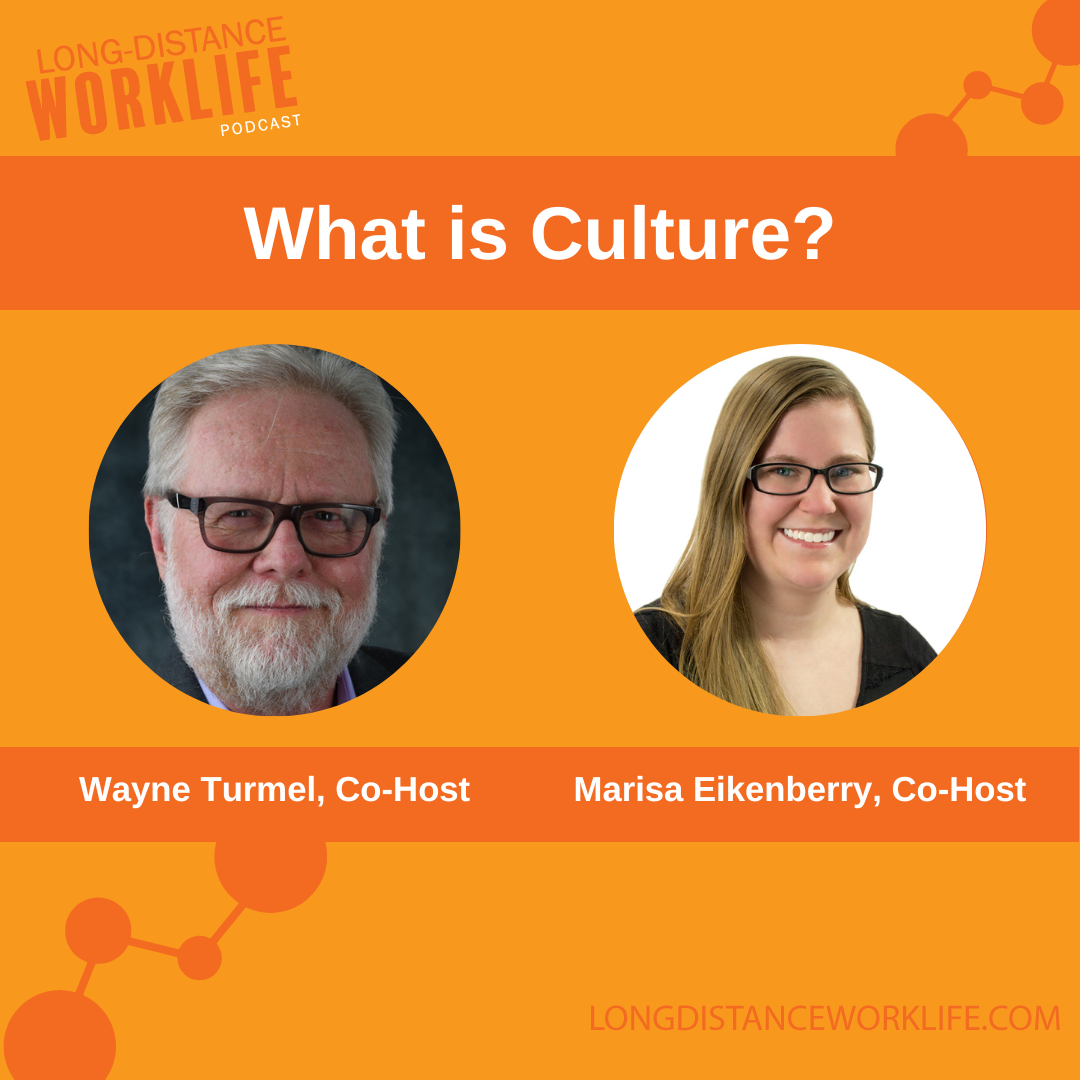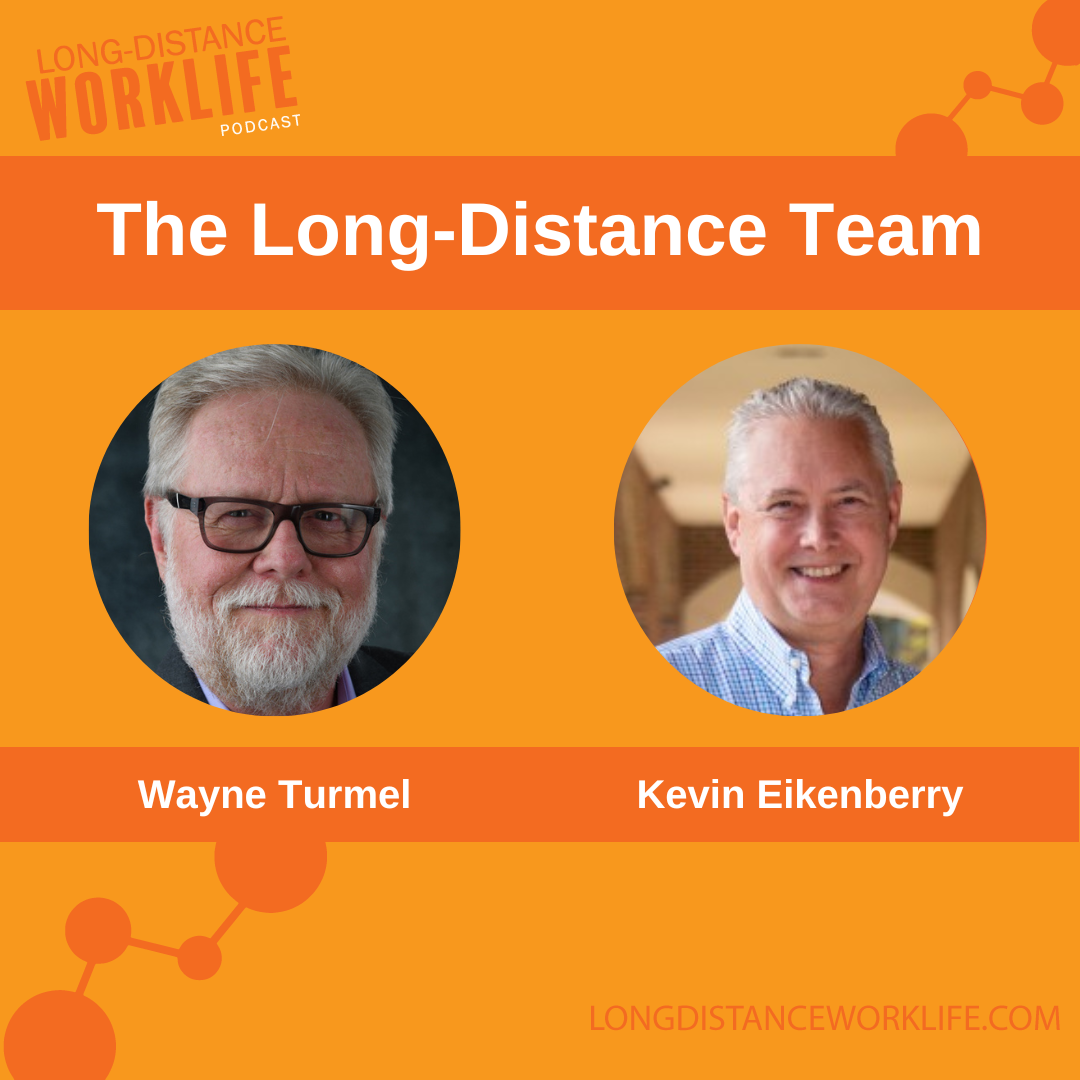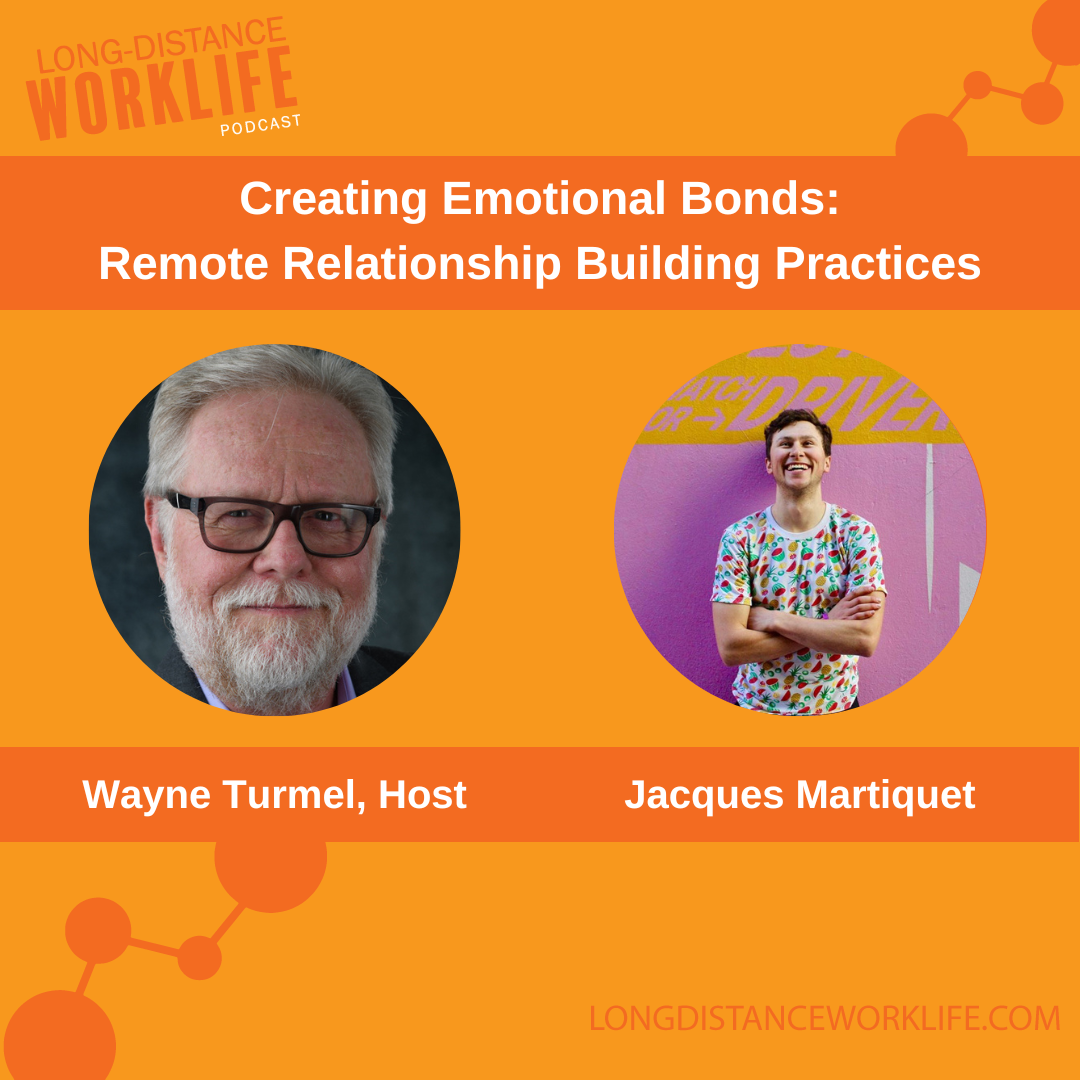00:00:08:00 - 00:00:35:22
Wayne Turmel
Hi, everybody. Welcome to the long distance work life. This is the podcast where we try to make sense of remote work in hybrid teams and generally keeping the weasels at bay while working in this crazy modern world. My name is Wayne Turmel. I am not Joan. Joined by my co-host Marissa today because we have a guest and this is going to be a really fun conversation.
00:00:36:09 - 00:00:55:02
Wayne Turmel
My guest today is Jack Mark, who is coming to us from my old hometown of Vancouver. He is, in fact, the party scientist. And before I do anything, Jack, you'd best explain who are you and what is a party scientist?
00:00:55:17 - 00:01:42:01
Jacques Martiquet
Yeah. Thanks so much. I'm so excited to talk about team connectedness in this new age where, you know, we're we're constantly replying to messages and being inundated by Zoom meetings. I'm very serious about public health and for me, party scientists is a light hearted way of saying really the science of connection and connectedness. And this is a massive determinant of our quality of life and our health and of team performance, psychological safety, which is the fertile soil for connection, for relationships.
00:01:42:01 - 00:01:58:12
Jacques Martiquet
This has been shown by Google to be the greatest determinant of team performance. So when I'm excited to get into some of the alternative non-mainstream practices of building relationships that foster our high performance on teams.
00:01:58:22 - 00:02:24:05
Wayne Turmel
Well, we will get to the practical stuff because we pride ourselves on doing that. And I am a big context guy. I think we need context because a lot of the conversation around remote work centers, around task completion. Right. Can people do their work to a standard for which people will pay them? And kind of that's the definition of work.
00:02:26:01 - 00:02:43:21
Wayne Turmel
But working apart from each other does doesn't entirely cause disconnection. But it certainly can be a factor. Can you tell us a little bit what your research has shown about disconnection, disengagement in the remote workplace?
00:02:44:17 - 00:03:24:12
Jacques Martiquet
Yeah, certainly. So there's a few reports that I can mention. The first is a report that came out by Betterup on the connection crisis at work. And this was done with about 3000 U.S. workers, 3000 likely average organizations. And they showed that low belonging, low connection scores are related to intentional to quit serious job searching, but also anxiety, loneliness, burnout and stress.
00:03:25:03 - 00:04:19:00
Jacques Martiquet
Um, they also showed that a lot of workers just don't look forward to work because they don't really like their coworkers or they don't even trust their coworkers. Um, if I were to look at the data more closely, it's something like 33% have quite limited trust in their coworkers. Now, how this applies to the remote and hybrid work setting, what I'm aware of just broadly from all the articles I've, I've, I've, I've written but also read about the return to office and yeah, one of the latest reports that I can dig up and include in the in the show notes Wayne is, you know, people are more willing to return to the office for that
00:04:19:00 - 00:04:48:06
Jacques Martiquet
social element. There is this this missing, this longing for these informal social connections that people have with their coworkers. And this is one of the reasons, motives for people wanting to return to the office. So, yeah, to summarize all of this, in a remote setting, it's harder to create these these emotional bonds. It's not just based on the intellect.
00:04:48:06 - 00:05:14:18
Jacques Martiquet
It's not just based on knowledge of someone's history. It's just some emotional feeling. Oh, I feel safe with this person. It's much more difficult to create this. It takes a lot more risks to create these emotional bonds with our coworkers, such that we actually look forward to our Zoom meetings versus what is happening right now is people are just that.
00:05:14:22 - 00:05:22:12
Jacques Martiquet
People are upset with how many meetings that they are attending and it's leading to to burnout.
00:05:23:07 - 00:05:57:23
Wayne Turmel
Now, I want to follow that up in a moment. But you said something about psychological safety. And this is a term that is starting to bubble up more and more. And it's kind of interesting that I mean, and is always in the early stages, the research is all over the board, but what do we mean? Let's compare and contrast psychological safety in a traditional in-person meeting versus psychological safety online.
00:06:00:00 - 00:06:35:09
Jacques Martiquet
Yeah. Yeah. So, I mean, my definition of psychological safety is just a fertile soil for social risk taking. I think there's a lot of parallels between a physical environment and a remote environment in a remote environment. It's it's more difficult to take social risks because there's less social cues. So when when a risk like a social risk, if I were to take a social risk and like, oh, like, look, I have this funny sign.
00:06:35:09 - 00:07:08:03
Jacques Martiquet
I'm excited we do. You know, I'm expressing myself. Maybe I'm revealing, like, something in my vicinity that's personal. Like, my excited son had that for five years. So that's a social risk. Now, in a remote environment, the social validation is more frictional. What I mean by social validation is praise recognition. It's it's acknowledging what someone has shared, acknowledging that someone has expressed themselves or taking a risk.
00:07:08:08 - 00:07:55:02
Jacques Martiquet
There's a lot more friction to that. So it's almost like we need to amp up the, the social validation and provide more cues, be more explicit with cues. So I think that fundamental to psychological safety is validation and encouragement, recognition of risks in a remote environment, a zoom meeting. It's more difficult to provide those cues because, I mean, a lot of people don't have this this kind of digital competence with with Zoom, like, there's so much we can do with Zoom to create that really fluid, non frictional communication and validation, such as.
00:07:55:14 - 00:08:20:10
Jacques Martiquet
Yeah. I mean, you can use the multi spotlight function. You can encourage people to speak up. You can nominate people to speak. You can use nonverbal cues with your hands. Right. Because we don't want to interrupt people. So there's there's all these alternatives to providing cues. I mean, one thing that I often do when I'm in a Zoom meeting is I'll request the person spotlight.
00:08:20:10 - 00:08:38:00
Jacques Martiquet
If we're for celebrating someone or for acknowledging someone, I request the person whose spotlight to go in a gallery mode and then they see everyone, right? So we want to make sure people aren't in gallery mode to see everyone's faces, to see that they're being accepted, that the risks are being celebrated.
00:08:39:03 - 00:09:15:12
Wayne Turmel
Yeah, I, I want to just say something from Wayne standpoint, because it's my show, darn it. But but actually, this is important. There's a feeling that because of these challenges that you've mentioned, that in-person meetings are, by definition better. And it's not like there is no challenge to psychological safety in a meeting, as a matter of fact. Studies show very often women feel physical intimidation or visible.
00:09:15:12 - 00:09:28:21
Wayne Turmel
Minorities are less likely to speak out in a face to face meeting because Bob is staring daggers at them over the table and they have to go back and sit two desks away from Bob. And so it's easier to say nothing.
00:09:29:06 - 00:09:30:10
Jacques Martiquet
While Sad said, Well.
00:09:30:12 - 00:09:55:07
Wayne Turmel
Not so. So this idea of psychological safety is relevant wherever. And it's the little things that we can do to generate that. And so now that it sounds like we're on the same page and we're agreeing with everything, we need to talk about techniques, and I'm going to tell you that I am a crusty old cis hat white guy.
00:09:55:14 - 00:10:24:03
Wayne Turmel
And I do I the minute somebody says I have an icebreaker, I clench so hard you can't believe it. It makes me I just get automatically uncomfortable. So Mr. Young party guy, how do teams go about, you know, creating this environment in ways that won't make my head explode?
00:10:24:13 - 00:10:52:00
Jacques Martiquet
Yeah. Um, two things I want to say. First of all, I'm a connection guy, and I use partying as one of my modalities. So I'm not just the party guy, although, I mean, most leaders are just they're not sufficiently creating the buy in the motives for people to participate in party activities, and they're also just not willing to take the risk.
00:10:53:03 - 00:11:28:11
Jacques Martiquet
I'm going to get into your question, like, how do we how do we really make people feel excited to participate in relationship building, to to move out of this kind of formal space, mechanical, formal and and into more of an emotional space, into more of a vulnerable space. And to just lighten up a bit, right now, the first thing I want to emphasize is just this concept of emotional availability as it relates to psychological safety.
00:11:29:08 - 00:12:10:17
Jacques Martiquet
And I think this is one of like the core traits for leaders to to cultivate if they want to create psychological safety. And emotional availability is just being present with others emotions and acknowledging what those emotions are, what is being shared. It's about availability is is there's receptivity. Um, so let's jump into your question and I'm like, please, please collaborate with me because I'm a young, open minded, you know, very positive.
00:12:11:10 - 00:12:42:11
Jacques Martiquet
Yeah, I'm, I'm, I'm kind of extremely biased because, you know, I've led thousands of parties and and I I'm biased in this way. Some people have not experienced what I've experienced and and haven't haven't had the experience to become motivated to experience new things. So, you know, I'm just thinking I'm just thinking when, you know, we we get motivated based on emotion, right?
00:12:42:11 - 00:13:05:08
Jacques Martiquet
But then we justify our actions with logic. So it's kind of a chicken and egg problem. I mean, we I want people to experience how it makes them feel. And when they experience how it makes them feel, it's like, well, I want to feel that way more often. I want to feel connected. I don't just want to think I'm connected to my coworkers.
00:13:05:08 - 00:13:36:09
Jacques Martiquet
I want to feel connected to my coworkers. Um, how I approach this problem generally, Wayne is, first of all, I'm getting everyone's consent. I'm getting everyone's consent before I lead something new. And I'm not, I'm not saying it's an icebreaker. I'm not saying it's even an energizer. I'm, I'm saying I'm I'm framing this as incredibly a nourishing for us.
00:13:37:00 - 00:14:13:11
Jacques Martiquet
It's it's for our well-being. It's for our our health. It's for for enjoying work more. It's it's all these personal reasons. So I think getting into the personal motives for people is really important. The second thing that I just want to emphasize is like when people understand how things work, they're more likely to consent and embrace it. So I like to explain how things work, and a lot of people aren't really familiar with social neurochemistry, like what?
00:14:14:06 - 00:14:40:20
Jacques Martiquet
You know, what are the other ways that we can connect other than just informal chatter over drinks? I mean, a lot of a lot of people that's that's the only way they socialize. Right. That's kind of the main norm for socialization. But really, there's this like massive field of possibility that nourishes us more, makes us feel healthier, more energized and, like, deepens our relationships.
00:14:41:12 - 00:14:43:08
Jacques Martiquet
Yeah, well, do you have anything to add or.
00:14:43:08 - 00:14:44:04
Wayne Turmel
Oh, for example.
00:14:45:22 - 00:14:46:12
Jacques Martiquet
Yeah, yeah.
00:14:46:12 - 00:14:47:14
Wayne Turmel
We can't just get on that road.
00:14:48:05 - 00:15:23:00
Jacques Martiquet
We can get into some tools, we can get into some tools. Um, let me just summarize this whole buy in thing. So the next thing I'll just say is baby steps. Baby steps. Um, if you throw up people an hour long experience, I mean, it's less, it's less likely they're going to consent to that. So I'm, I'm a huge advocate for snacks, for connection snacks and connection snacks that vitalize people, but also create this this vulnerability.
00:15:23:00 - 00:15:47:22
Jacques Martiquet
Okay. All right. So what can we do? I mean, like a lot of people are not willing to take risks. Okay? A lot of leaders are trying to save face and they're not willing to take the risks necessary to drastically improve their reputation. Right. Because there's a risk some people might not like it. Some people may think it's ridiculous and a waste of time.
00:15:48:04 - 00:16:05:13
Jacques Martiquet
I've I've dealt with leaders who feel this way all the time around, like stretching to music as an example like that. That's where I encourage a lot of leaders to start. Okay. I encourage a lot of the leaders to start with two things. Two things. The first is how almost did that.
00:16:05:22 - 00:16:18:16
Wayne Turmel
Yeah. See appropriate changes. This is a family walk for the first session and he started on an interesting finger.
00:16:18:16 - 00:16:54:16
Jacques Martiquet
Yeah, yeah. You can tell you can have a rule breaker, can't you? Um, so there's two things I encourage people to start. First of all, music. Music, especially nostalgic music, puts people in a different mood. It's variable, but certain songs just improve people's mood, moods and creates creates less stress, reduces stress. So I like I encourage leaders if they want to try out new relationship building practices to begin with, some form of of stretch changing the physiology of the body.
00:16:54:16 - 00:17:20:14
Jacques Martiquet
So get people up, get people moving in some way. They can just do simple stretches to open their posture. Right. Maybe it's a yoga stretch with music, calming music, maybe funny music. Maybe it's a sing along that everyone loves. People are stretching, they're changing their physiology. And then I like to stack an intentional, structured one on one prompt.
00:17:21:23 - 00:17:47:09
Jacques Martiquet
Intentional is we choose it beforehand. We choose it beforehand to invite people into a personal, vulnerable space. Okay, intentional. What did I what did I say? Structured. So it's a prompt. It's like a question you answer or it's it's a phrase dot, dot, dot. Like, um, my favorite Christmas memory is dot, dot, dot. Okay, that's, that's a prompt.
00:17:48:01 - 00:18:15:01
Jacques Martiquet
Hear one on one, one on one because one more, one on one. There's a massive spectrum for vulnerability versus one more in front of a large group. Okay, so deep relationships are easier to form when we're one on one them when it's private and this is the benefit this is really one of the massive benefits of of remote work, is that we're not in a space where everyone's talking and we're getting distracted all the time.
00:18:15:22 - 00:18:17:03
Jacques Martiquet
So to summarize.
00:18:17:03 - 00:18:19:02
Wayne Turmel
You can use things like breakout rooms.
00:18:19:20 - 00:18:20:10
Jacques Martiquet
Totally.
00:18:20:17 - 00:18:24:06
Wayne Turmel
Totally separate chat in teams or something like that.
00:18:24:11 - 00:19:02:01
Jacques Martiquet
Yeah, yeah, yeah. Um, so the point is summarize all this. There's three, there's three components here. Music movement and then vulnerability through a structured prompt. You could do this probably 4 minutes doesn't need to be, doesn't need to be long. And this is going to not only impact the rest of the meeting, but it's also going to gradually build more and more of this, these relationships and friendships at work.
00:19:03:12 - 00:19:13:21
Wayne Turmel
And that is a reasonable place given where we are in time to stop this conversation. There is so much more that we could do. Hijack. M.K. Where can people find you.
00:19:15:07 - 00:19:16:20
Jacques Martiquet
The party scientists dot com.
00:19:18:01 - 00:19:47:11
Wayne Turmel
And we will have links to the party scientists dot com and Jax link LinkedIn page and a couple of other things on our show notes which are of course at long distance work like dot com by the time you are hearing this, we will be dangerously close to the launch of our new book, The Long Distance Team Design Your Team for Everyone's Success.
00:19:47:11 - 00:20:20:00
Wayne Turmel
We're very excited about that. And of course, if you like the show, you like subscribe, you understand podcasts, you know how that works. And if you want to reach either myself or Marissa with questions or comments or vicious personal attacks or show ideas have at it, we can be found at our name and Kevin Eikenberry dot com jock thank you so much for taking the time man.
00:20:20:00 - 00:20:25:18
Wayne Turmel
I really appreciate it. I'm going to let you say goodbye real quick.
00:20:26:16 - 00:20:34:02
Jacques Martiquet
Goodbye, everyone, and hope this has encouraged you to take a few more risks.
00:20:34:02 - 00:21:00:02
Wayne Turmel
And that's it. We will see you on the next show. Thanks, everybody, for joining us on the long distance work life. Don't let the weasels get you down and we will talk again soon.








